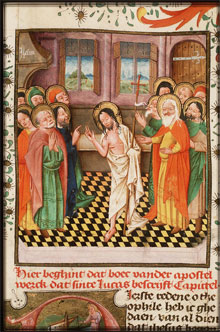
The Third Sunday of Easter (Year "B")
THE RISEN LORD OFFERS FORGIVENESS
[Texts: Acts 3.13-15, 17-19 [Psalm 4]; 1 John 2.1-5; Luke 24.35-48]
A dozen years ago, the veteran actor Richard Farnesworth received an Academy Award nomination for his performance in The Straight Story. Based on a true story, it tells of Alvin Straight's journey from Iowa to Wisconsin on a lawn-mower tractor to be reconciled with his estranged brother Lyle who had suffered a stroke. The thought of dying without being reconciled with his brother galvanized Alvin's action.
His 500-kilometre trip would take six weeks to finish. As viewers of the film follow his unusual travel, they learn of other aspects in his life and those he meets needing forgiveness and healing. We can see in this tale a parable of the brokenness of our world that calls out for the Easter message of repentance, forgiveness and healing.
As in other resurrection appearances, today's gospel narrative contains a mission dimension. Jesus commissions His disciples to go out to others with a summons to repentance. It is a proclamation directed “to all nations” and to all who live in them. “Beginning from Jerusalem”, forgiveness of sins is to be offered to all who repent.
Today's gospel account begins with the last verse of the Emmaus story in which Jesus had encountered two downcast disciples journeying outside Jerusalem. Their meeting with Jesus had fired their hearts and energized them for a quick return to Jerusalem to share their experience with the assembled disciples.
When Jesus suddenly stood in their midst, the apostles first of all thought He was a ghost. For clearly there was a difference to the manner of His risen presence to them. Yet, after showing them his hands and his feet (a reference to the imprint of the nails made when he was crucified), Jesus declared that no ghost has flesh and bones as he had. Nor would a ghost eat fish as Jesus did.
Though changed, the Risen Lord remains the same Jesus they had known. And the ministry Jesus exercised—befriending sinners, calling them to conversion and offering them forgiveness—continues. Only now it will be carried out by them under the guidance of the Holy Spirit.
The Book of Acts shows how zealously the heirs of Jesus' ministry—particularly Peter and John but, later also, Paul and the new generation of church elders—proclaimed repentance and offered forgiveness, healing the spiritual and physical wounds of broken lives.
In today's reading from Acts, Luke demonstrates the dynamism of the early church's evangelizing efforts. Having politely addressed his audience, Peter's sermon began with an Old Testament reference (3.13a), a Christological affirmation (3.13b-15), a ‘proof’ from Scripture (3.18) and ended with a call to repentance (3.19) that focused the sermon on the specific needs of the assembled throng (3.17).
Peter's conclusion said that ignorance may be a dimension of some sin (“I know that you acted in ignorance, as did also your rulers”), a view Jesus had given voice to during the Passion (“Father, forgive them; for they do not know what they are doing”—Luke 23.24). However, ignorance of sin's root causes cannot preclude a call to repent, to turn to that new life which God now offers through the risen Jesus.
Proclaiming the forgiveness of sins has always been closely associated with the message of Christ's resurrection. The First Epistle of John follows this pattern, but also deals with an issue that intruded upon the Church in the latter part of the first century: how could believers continue to be true to the message of Jesus and to his way of life when—though they are Christians now—sin remained part of their behaviour, their lives. For Christian life means “walking” or behaving as Jesus did: keeping the commandments and obeying what he said.
By affectionately calling his fellow Christians “my little children,” John stressed the new-born's life which they share with their risen Lord as a result of baptism into his death and resurrection. Then he went on to remind them that Jesus Christ the righteous remains every Christian's “advocate with the Father” when he or she falls into sin.
Knowing that the risen Jesus never ceases to offer pardon, healing and peace can occasion disbelief for sheer joy among Christians today, just as the risen Lord's appearance had in the disciples on the evening of that first Easter.
No comments:
Post a Comment